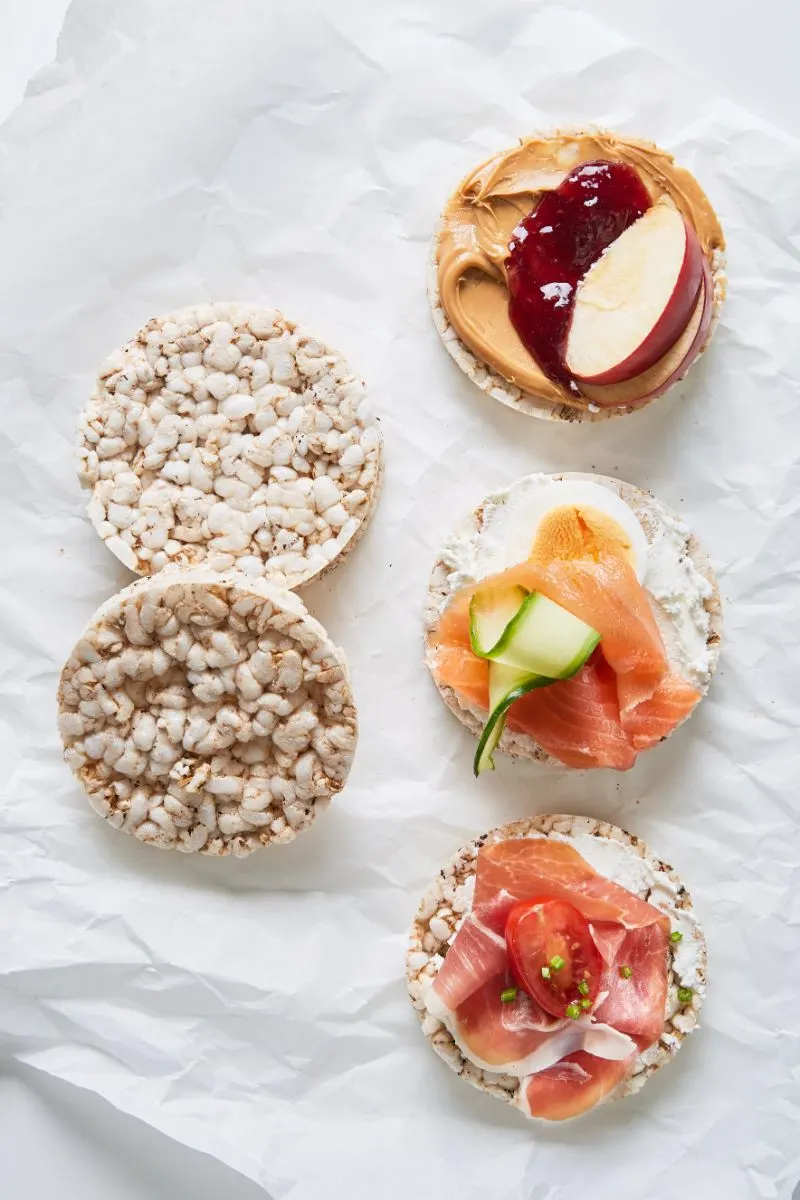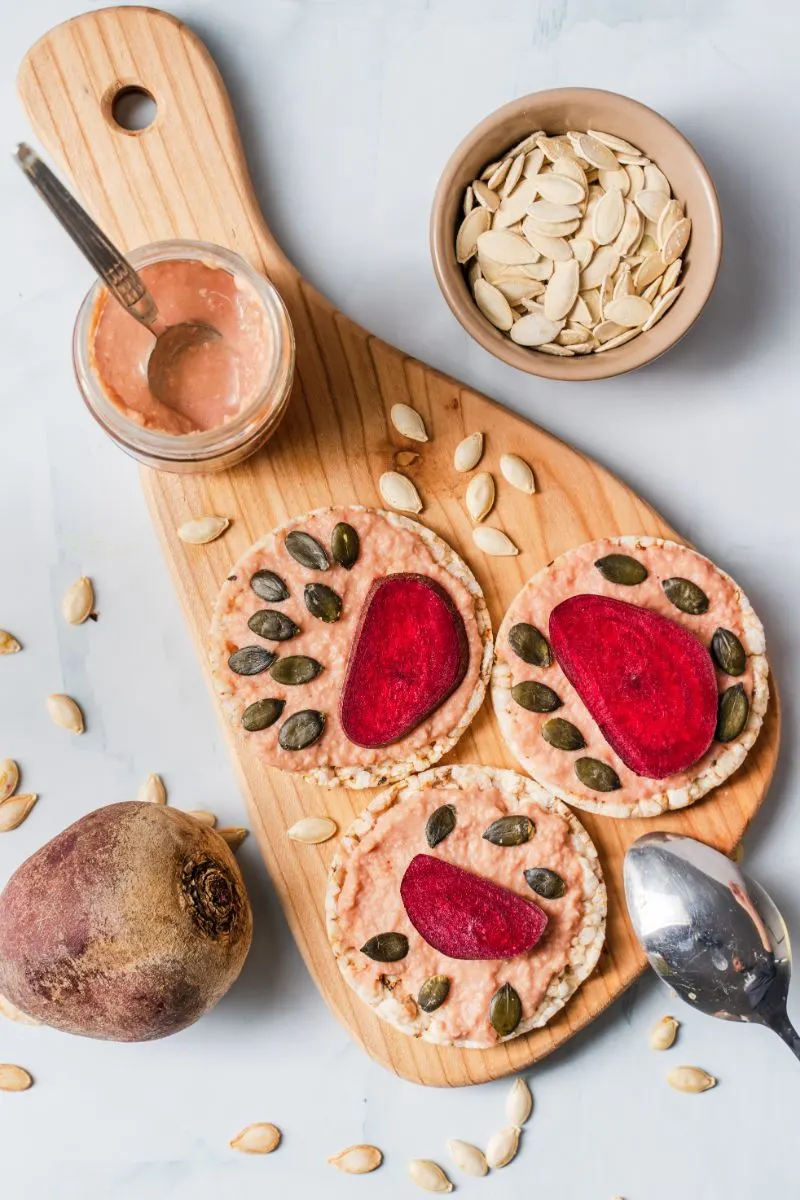The road to muscle gain is often paved with predictable dietary staples: lean meats, complex carbohydrates, and an arsenal of supplements. But what if the key to an effective bulking diet isn’t just about what everyone else is eating?
Today, we turn our focus to an unlikely contender in the bulking arena – the rice cake.
At first glance, this airy snack might seem more suited to weight loss plans than muscle-building regimes. However, could there be more to rice cakes than meets the eye?
Through a blend of nutritional analysis, expert insights, and a dash of culinary creativity, we’re setting out to uncover whether rice cakes can truly contribute to your bulking goals.
The Unexpected Bulking Companion: An Introduction to Rice Cakes
Rice cakes, those unassuming discs of puffed rice that have quietly sat on grocery store shelves, often overlooked by those on a quest for the perfect bulking diet, may just be the hidden gem you’ve been searching for.
Known for their light, airy texture and subtle crunch, they have traditionally been pigeonholed into the category of diet foods or seen as a bland, quick snack option.
However, when it comes to bulking – the process of gaining muscular size and strength through a strategic combination of training and nutrition – rice cakes present an unexpectedly versatile and effective option.
At the heart of their potential as a bulking companion lies their nutritional profile.
Rice cakes are predominantly made of carbohydrates, providing a quick source of energy that can be invaluable for fueling heavy workout sessions.
Carbohydrates are crucial for replenishing glycogen stores in muscles, which are depleted during intense exercise.
This not only aids in recovery but also supports sustained energy levels, allowing for more effective workouts over time. Furthermore, the simplicity of rice cakes makes them a perfect canvas for adding other nutrients into your diet.
By topping them with protein-rich foods such as peanut butter, cottage cheese, or lean meats, you can transform a simple rice cake into a balanced, muscle-building snack.
The myth that rice cakes are unsuitable for bulking mainly stems from their low calorie and protein content when consumed alone. However, this overlooks their potential as part of a broader dietary strategy.
Their low calorie count can actually be a boon, making them a perfect option for adding frequency to meals without excessively increasing caloric intake. This can help manage fat gain while bulking, a common concern for many.
Additionally, their blandness is an asset, allowing for versatility in creating both sweet and savory snacks tailored to individual tastes and nutritional needs.
Eye-opening insights from fitness enthusiasts and nutritionists are beginning to shed light on the value of incorporating rice cakes into a bulking diet.
Not only are they easy to digest, making them a great pre-workout option, but their high glycemic index means they can quickly provide the glucose needed for muscle recovery post-exercise.
This makes them particularly useful for those looking to optimize their recovery processes and ensure that their muscles have the necessary fuel to rebuild stronger.
The Caloric Blueprint
Bulking hinges on one fundamental principle: consuming more calories than your body burns in a day, known as a caloric surplus. This surplus provides the body with the extra energy needed to repair and grow muscle tissue after intense workouts.
The magnitude of this surplus can vary depending on individual metabolism, current body composition, and fitness goals, but the underlying concept remains constant.
Without sufficient calories, the body lacks the necessary fuel to support muscle growth, leading to stagnation or even loss of muscle mass.
Macronutrients: The Building Blocks of Bulking
Macronutrients – carbohydrates, proteins, and fats – play distinct and crucial roles in the bulking process:
Proteins, the building blocks of muscle, are essential for repair and growth of muscle tissue. A diet rich in high-quality protein supports the body’s ability to synthesize new muscle fibers, especially important after training sessions when muscle recovery takes place.
Carbohydrates provide the energy muscles need to perform at their best during workouts. They’re also vital for replenishing glycogen stores post-exercise, which is crucial for recovery and growth.
Carbohydrates stimulate insulin release, a hormone that helps shuttle nutrients into cells, including amino acids into muscle cells, facilitating repair and growth.
Fats are often underrated in their importance for bulking. Beyond being another source of calories, fats are essential for the production of hormones, including testosterone, which plays a significant role in muscle growth and recovery.
Rice Cakes in the Mix
How do rice cakes fit into this intricate dance of calories and nutrients?
At first glance, rice cakes might seem too simple or low in calories and protein to make a significant impact. However, their true value in a bulking diet lies in their role as a versatile carbohydrate source.
Lightweight and easily digestible, rice cakes provide a quick energy boost, making them ideal as a pre-workout snack to fuel your training sessions.
Post-workout, they serve as an excellent vehicle for more nutrient-dense toppings, facilitating recovery by replenishing glycogen stores and providing essential nutrients when topped with protein and fats.
Furthermore, rice cakes’ simplicity allows for flexibility in managing your caloric intake and macronutrient distribution.
They can be customized to fit into any part of a bulking diet, whether you’re looking to add clean calories, balance your macros, or simply enjoy a guilt-free snack that supports your fitness goals.
Rice Cakes and Muscle Growth: A Surprising Connection
Rice cakes, often relegated to the sidelines as a diet staple or considered too bland to be of any real culinary interest, hide within their simple composition a surprising utility for those focused on muscle growth.
This seemingly modest snack, commonly associated with weight loss regimes rather than bulking phases, carries within it an ability to support and enhance the muscle-building process, challenging preconceived notions about what foods are best suited for gaining muscle.
At their core, rice cakes are composed mainly of carbohydrates, providing a quick and efficient source of energy.
This is particularly beneficial when considering the demands of intense physical training, where readily available energy sources can significantly impact performance and recovery.
The primary role of carbohydrates in muscle growth cannot be understated; they are crucial for replenishing glycogen stores depleted during exercise, thereby preventing muscle catabolism (breakdown) and facilitating recovery.
In this light, rice cakes present an excellent option for post-workout nutrition, offering a fast-digesting carb that quickly aids in the restoration of glycogen levels, setting the stage for muscle repair and growth.
Furthermore, the versatility of rice cakes extends beyond their nutritional composition. Their neutral flavor and crunchy texture make them an ideal canvas for a variety of protein-rich toppings, transforming them from a simple carb source into a balanced, muscle-building snack.
Toppings can range from spreads like almond or peanut butter, which add healthy fats and protein, to lean meats or fish, such as chicken breast or salmon, further enhancing the protein content necessary for muscle synthesis.
Even cottage cheese or Greek yogurt, topped with some berries or banana slices, can turn a plain rice cake into a delicious, nutrient-packed treat that supports muscle growth while satisfying taste buds.
This adaptability of rice cakes is especially appealing when considering the dietary monotony often experienced during bulking phases, where the constant need for high-calorie, protein-rich foods can become mundane.
Incorporating rice cakes into one’s diet introduces an element of creativity and flexibility, allowing for a variety of tasty combinations that can keep the diet interesting and sustainable over longer periods.
Creative Culinary Creations: Elevating Rice Cakes from Bland to Grand
Bulking foods often conjure images of repetitive meals: endless chicken breasts, broccoli, and sweet potatoes. However, the quest for muscle gains doesn’t have to doom us to a monotonous diet.
Enter the humble rice cake, a versatile canvas that can transform bulking meals from bland to grand with a bit of creativity. Through personal experimentation and culinary adventure, I’ve discovered some delightful ways to elevate rice cakes into something truly special.
One of my favorite creations is what I like to call the “Protein-Packed Powerhouse” rice cake. Start by spreading a thick layer of almond butter on a plain rice cake for a dose of healthy fats and protein.
Then, top it with slices of banana and a sprinkle of chia seeds. For an extra protein kick, a dollop of Greek yogurt completes this masterpiece. Not only is it incredibly tasty, but it also offers a balanced mix of macronutrients essential for muscle repair and growth.
For those savory cravings, I concocted a recipe inspired by the classic Italian caprese salad. Begin with a thin spread of pesto on your rice cake, add slices of fresh mozzarella, and top with ripe cherry tomatoes and basil leaves.
A drizzle of balsamic glaze adds a sweet and tangy finish. This “Caprese Crunch” not only satisfies those savory taste buds but also incorporates a good mix of protein, fats, and the antioxidant lycopene from tomatoes, making it a nutritious bulking snack.
Another experiment led me to the “Smoked Salmon Stack.” I spread cream cheese on a rice cake, layered on smoked salmon, added a few capers, and finished with thinly sliced red onion and a squeeze of lemon juice.
The omega-3 fatty acids in the salmon promote muscle recovery and inflammation reduction, making this not only a gourmet treat but a smart choice for anyone focused on muscle growth and recovery.
On days when I craved something sweet yet nutritious, the “Chocolate Peanut Butter Dream” became my go-to. I’d melt a small amount of dark chocolate and mix it with peanut butter, then spread this mixture over a rice cake.
Topping it with sliced strawberries added natural sweetness, antioxidants, and visual appeal. This combination provides a satisfying treat that’s rich in protein and healthy fats, proving that dessert can indeed have a place in a bulking diet.
Lastly, the “Avocado Toast, Reinvented” rice cake breaks breakfast boundaries. Mash ripe avocado with lime juice, salt, and pepper, then spread it generously over a rice cake.
A poached or fried egg on top adds protein, and a sprinkle of red pepper flakes offers heat. This version of avocado toast is not only Instagram-worthy but packed with nutrients that support muscle growth and energy.
Beyond Bulking: The Holistic Health Benefits of Rice Cakes
While rice cakes have their moment in the spotlight as an underrated ally in the bulking phase, their benefits extend far beyond muscle growth. Incorporating rice cakes into one’s diet can contribute to various aspects of overall health, touching on everything from digestion to heart health.
Their simplicity and versatility make them a valuable addition to a balanced diet, and understanding these wider health benefits can encourage their more frequent inclusion in meal planning.
Digestive health is one area where rice cakes can play a positive role. Being made mostly of whole grains, particularly when opting for brown rice versions, they provide a source of dietary fiber.
Fiber is essential for maintaining a healthy digestive system, aiding in regular bowel movements, and preventing constipation. Additionally, a diet rich in whole grains has been linked to a lower risk of developing gastrointestinal disorders such as diverticulitis.
The lightness of rice cakes also makes them easy to digest, offering a go-to option for those with sensitive stomachs or anyone seeking a light snack that won’t weigh them down.
When it comes to heart health, rice cakes again offer benefits, especially the whole-grain varieties. Whole grains are associated with a lower risk of heart disease, primarily due to their effects on cholesterol levels and blood pressure.
The fiber content in whole-grain rice cakes can help reduce bad cholesterol (LDL) levels, thereby decreasing the risk of plaque buildup in the arteries. Furthermore, the low sodium content in rice cakes makes them a heart-friendly snack, particularly appealing in a world where high-sodium snacks are all too common.
Rice cakes also contribute to a balanced diet by providing a low-calorie, gluten-free carbohydrate option. This is particularly beneficial for those managing their weight or individuals with gluten sensitivities or celiac disease.
The ability of rice cakes to act as a blank canvas for a variety of toppings means they can be easily incorporated into meals across the dietary spectrum, from vegan to carnivorous diets, ensuring everyone can enjoy the health benefits they offer.
Their impact on blood sugar levels is another aspect worth considering. While plain rice cakes have a high glycemic index (GI), pairing them with low-GI foods like proteins and healthy fats can balance out their effect on blood sugar.
This combination can lead to slower digestion and a more gradual release of glucose into the bloodstream, contributing to better blood sugar control and sustained energy levels. This is particularly important for individuals with diabetes or those aiming to prevent blood sugar spikes.
Lastly, incorporating rice cakes into one’s diet supports the cultivation of mindful eating habits. Their blandness, far from being a drawback, encourages creativity in topping choices, making the act of eating more engaging and satisfying.
This can lead to a more mindful relationship with food, where choices are deliberate and savored, contributing to overall well-being.
In looking beyond bulking, rice cakes emerge as a flexible, health-promoting food suitable for a wide range of dietary needs.
From supporting digestive and heart health to fitting seamlessly into a balanced diet and promoting mindful eating, the holistic health benefits of rice cakes underscore their value not just to those focused on fitness, but to anyone interested in maintaining a healthy lifestyle.
Chia Seeds Side Effects In Females
